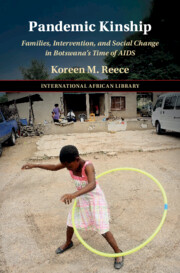Dipuo reacted to emergent trends in negotiating contemporary marriage by muttering ‘Re bona dilo’ – we are seeing things. The comment aptly summarises the central kgang of conjugal relationships among Batswana: the management of recognition. Seeing things, saying and hearing things, and knowing things – whether about a pregnancy or about a relationship moving towards (or through or away from) marriage – form and transform kinship by posing problems to be negotiated within and between families. The ways in which recognition is acquired, and the risks and opportunities that it presents, differ for men and women. But, for both, a full range of kin relationships are implicated: from intergenerational relationships, to sibling relationships, to conjugal relationships. Dikgang from the past may emerge unexpectedly and require navigation; dikgang of the future are anticipated in addressing those of the present. I suggest that pregnancy and marriage mark such potent means of both reproducing and reorganising kin relations because they draw all of these dikgang together, implicating and engaging the broadest possible range of kin in reflecting on and addressing them. Rather than marking disruptions in kinship practice that suggest significant social change or breakdown, the dikgang that commonly arise in Setswana pregnancy and marriage – and that have filled anthropological accounts of both since the colonial era – may be critical factors in continuously reconstituting and reorienting Tswana kinship, thereby securing its continuity and responsiveness to contexts of rapid change.
Dipuo’s comment also implies that things are now being seen in ways they shouldn’t – an observation suggestive of the problematic new visibilities of illness and mortality that may emerge in conjugal relationships during a time of AIDS. As we have seen, the risks posed by HIV and AIDS are in many ways interpretatively aligned with, and actively absorbed into, the dikgang long associated with intimate relationships among Batswana. This convergence may go some way in explaining both the uncommonly high prevalence of the disease in Botswana and its tenacity in the face of extensive public education, treatment, prevention, and behaviour change campaigns (cf. Bochow Reference Bochow2017). But it also underscores the creative ways Batswana have found to live with the epidemic. While the repercussions of AIDS and related public health discourse for managing conjugal relationships are considerable, and the stakes significant, Batswana work to keep them oriented around kin-making and self-making; as such, they assert continuity not only with the dikgang but with the imperatives and terms of negotiation that have long characterised Tswana kinship. In this sense, Tswana families and kinship practice may be better able to respond to the crisis of AIDS than has generally been assumed – and they may form an important, largely overlooked, site of resilience in the heart of the epidemic.
***
INTERLUDE: Family Portrait
It was a hot, hazy day, and we hung about the yard listlessly. None of us were motivated to do anything, except the younger children and their friends from the neighbourhood, who had stretched out on the cool, smooth concrete of the stoep, assiduously colouring in books I had brought them at Christmas.
Watching them, I hit upon an idea. I called the older children over. They were either bored, curious, or respectful enough to agree when I asked them whether they would like to help me with something for my schoolwork. I tore out some long, sturdy pages from my drawing book and gave them a couple each, asking the children to describe their family on them. After establishing whether they were to write or draw – I told them both were fine – they each beetled away into separate corners of the house to get started.
They all took the assignment quite seriously. As evening approached they asked if they could have more time, and another sheet of paper, and whether it should be in colour or ink or if just pencil was okay. I told them to take as long as they liked and do it however they liked.
It was perhaps a week before the first started trickling in: Tefo’s, in heavy pencil, a series of lines and squiggles that represented the lands; Tshepo’s, a list of all her brothers and sisters and cousins, the printing narrowing off into the corner of the page.
But Lesego’s struck me. In neatly written, careful English, she described her family: her father, mother, and sister, where her mother worked, the house they lived in, and what she wanted to be when she grew up. Below the narrative was a drawing of her two parents, sister, and herself, lined up from tallest to smallest and holding hands, their clothes neatly coloured in. It was formal and practised, as if she had done similar assignments at school.
Lesego, of course, lived in the same yard as me. We were between 15 and 20 people, spanning four generations, all jumbled together into the same two houses. At the time, her mother lived away, partly for ease of access to work. She may have known her father by having had him pointed out to her – he was pointed out to me once or twice – but, as far as I knew, she had never lived with him, and he had separated from her mother long ago. Her mother had since had a few relationships, some serious enough that the girls had met the man, but nothing more. And Lesego knew that I knew all of this.
I never asked Lesego about her family portrait. I was never sure how to put it without seeming to doubt her portrayal. Was it a habit borne of repeated school projects? An expression of desire, or aspiration? Was it an expectation, an ideal, her ideal? Or was it an experience of hers I was unfamiliar with? Where had it come from?



